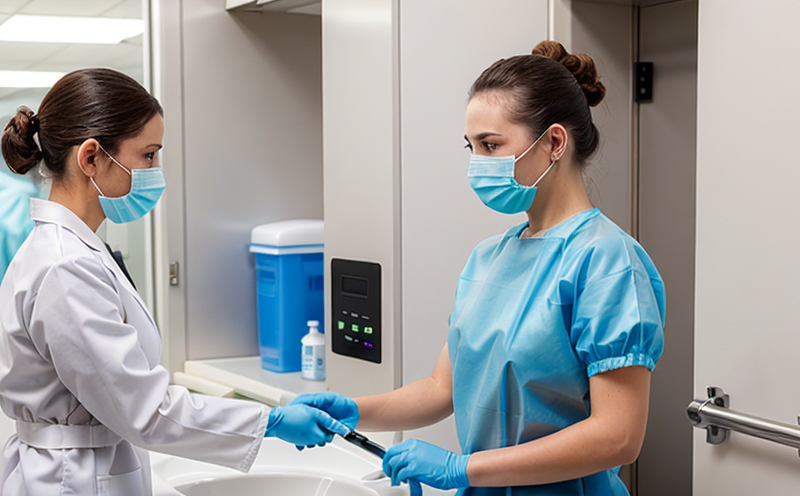Evaluation of antimicrobial properties in industrial filter fabrics
The evaluation of antimicrobial properties in industrial filter fabrics is a critical process that ensures these materials meet stringent hygiene standards. Industrial filter fabrics, used in various sectors such as healthcare, pharmaceuticals, and food processing, are designed to protect against microbial contamination. The testing of these fabrics involves rigorous methodologies aimed at assessing their ability to inhibit or destroy microorganisms.
The first step in this process is the selection of appropriate test specimens. Typically, industrial filter fabrics undergo extensive sampling procedures to ensure that the tests represent real-world conditions accurately. Specimens are prepared following strict protocols to maintain consistency and repeatability throughout the testing process. Once prepared, these samples are subjected to a series of antimicrobial challenge tests.
The challenge tests can vary depending on the specific microorganisms being targeted. Common pathogens include bacteria such as Staphylococcus aureus (MRSA) and Escherichia coli O157:H7, as well as fungi like Candida albicans. The testing environment is carefully controlled to replicate conditions under which these fabrics would be used in industrial applications. This includes temperature, humidity, and exposure time.
The efficacy of the antimicrobial treatment is then measured through various quantitative methods. These can include colony-forming unit (CFU) counts before and after exposure to the test organisms, as well as visual assessments for signs of microbial growth or decay. Additionally, microbiological assays such as the Zone of Inhibition Test may be conducted to quantify the extent of antimicrobial activity.
Instrumentation plays a crucial role in these evaluations. High-resolution microscopes and imaging systems are used to visualize any changes in the surface structure of the fabric that might affect microbial adhesion or growth. Furthermore, quantitative PCR (qPCR) techniques can be employed to detect and quantify specific genetic markers associated with antimicrobial activity.
The results from these tests form a comprehensive report detailing the performance characteristics of the industrial filter fabrics under evaluation. This document serves as crucial evidence for regulatory compliance, product certification, and internal quality control processes. It also provides valuable insights for continuous improvement in fabric design and manufacturing techniques.
- ISO 18174-2:2013 specifies the protocol for determining antimicrobial activity of textiles against Gram-positive bacteria like Staphylococcus aureus (MRSA).
- ASTM D6862 is used to evaluate the efficacy of antimicrobial treatments on polyurethane and vinyl-coated fabrics.
Why Choose This Test
Selecting this test is essential for several reasons. Firstly, it ensures that industrial filter fabrics meet the highest hygiene standards required in critical environments such as hospitals and cleanrooms. Secondly, compliance with international standards enhances trust among customers and regulatory bodies. Thirdly, the test provides valuable data on product performance, which can guide further developments and innovations.
For quality managers and R&D engineers, this service offers a robust framework for assessing new products or improvements to existing designs. Compliance officers benefit from having clear, verifiable evidence of adherence to regulatory requirements. Procurement teams gain confidence in selecting suppliers who adhere to these stringent testing protocols.
Quality and Reliability Assurance
The quality assurance process for industrial filter fabrics is underpinned by comprehensive testing that evaluates not only antimicrobial properties but also other key performance indicators. This includes mechanical strength, durability, and resistance to chemical degradation. By integrating these tests into the overall evaluation, we ensure that each product meets the highest standards of reliability and longevity.
Our laboratories employ state-of-the-art equipment and methodologies to conduct these evaluations. Our team of experts ensures that every test is conducted with precision and adherence to international standards such as ISO 18174-2:2013 and ASTM D6862. This commitment to quality is reflected in the consistent accuracy and reproducibility of our results.
Through rigorous testing, we provide clients with confidence that their industrial filter fabrics will perform reliably under challenging conditions. Our focus on quality assurance helps to build long-term partnerships based on trust and reliability.
International Acceptance and Recognition
- ISO 18174-2:2013 is widely recognized for its standardization of antimicrobial activity testing in textiles, including industrial filter fabrics.
- ASTM D6862 has gained international acceptance for evaluating the effectiveness of antimicrobial treatments on coated and laminated materials.





